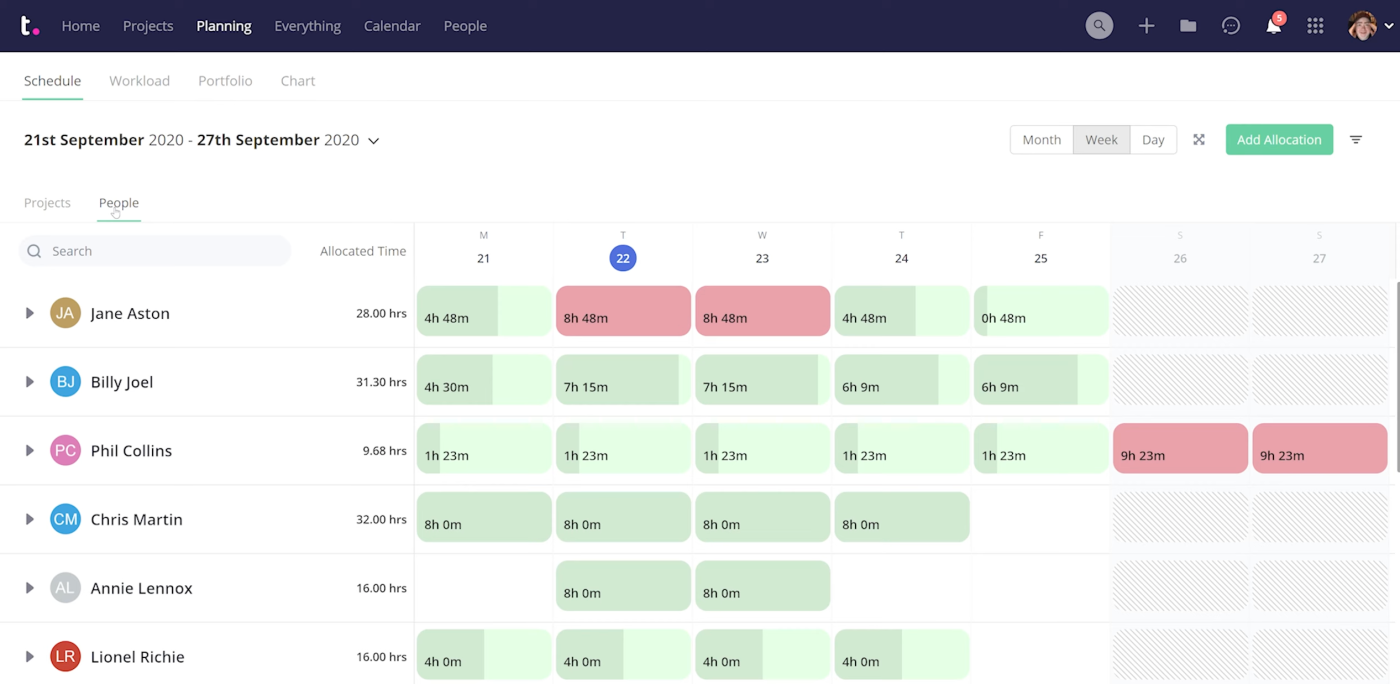One of the hardest jobs for a project manager is figuring out how to manage the capacity of their team members and streamline the team’s workload. Your team members only have a certain amount of capacity they can offer before negative effects like burnout and bottlenecks occur. However, while capacity management is important, it can be difficult to accomplish without the right tools.
Capacity planning tools can help you access your team's functionality in real-time so that you can improve project planning and resource utilization. But not all capacity planners are made equal.
In this article, we will help you learn what you should look for in a capacity management tool and some of the best options available on the market.
What is a capacity planning tool?
A capacity planning tool is software that helps businesses monitor and evaluate their resource capacity. That includes team capacity, resource allocation, available resources, and even your technology and tool capacity. Capacity tools will take all of that information and use demand forecasting to make sure that there are enough resources available to complete incoming projects.
Project managers rely on capacity planning tools for project scheduling. The capacity planning process is complicated, and when you don’t have the right tools, it can be overwhelming and lead to major issues. With the right project planning tools and resource management tools, it becomes easier for capacity planners to do their job and help improve teamwork while moving the company towards its goals.
Learn how Teamwork’s resource management features can help take the guesswork out of your capacity planning.

Key features to look for in capacity planning software
Here are a few of the key features that you'll want to be on the lookout for when comparing your resource capacity planning software options:
Uses a simple yet effective dashboard
A powerful feature of a resource management system is a simple, user-friendly dashboard that delivers clear answers. When a dashboard is complicated or doesn’t display useful information, the entire tool can become a chore to use. A good dashboard will show you things like current and future capacity, billable hours, and resource availability at a glance.
Provides actionable data and real-time reporting
A capacity planning tool should capture important metrics and allow managers to use that data to make better decisions. Real-time reporting is important in today’s modern workplace, as it allows managers and project planners to be more agile and get a true picture of their current capacity, which aids future decision-making.

Bye-bye burnout and hello efficiency
See who has capacity to take on more work, quickly assign tasks to the right people, and ensure no one is overburdened. Get a holistic view into your team's workload with Teamwork.com.
Encourages automation of workflows
Some of the biggest slowdowns in the workplace are repetitious and time-consuming tasks. Trying to manually track down each employee to check on their capacity is just about impossible. A great capacity planning tool will help you to effectively automate workflows so that you can focus on the optimization of your systems and high-level tasks.
Integrates easily with the other tools in your agency's tech stack
No matter how many great features a software has, it won’t be useful to your organization if you can’t integrate it with other tools. A resource planning tool should be able to integrate with things like your customer relationship management (CRM) system, office calendar, and any other management systems that you use to operate your business.
5 powerful capacity planning tools
Now that you know what makes a capacity planning tool effective, let’s look at five different tool options so that you can evaluate if they will fit your organization’s needs.

1) Teamwork

Teamwork is a project management platform completely focused on client work. Every aspect of the platform helps you deliver work on time and to the satisfaction of your clients. You can use Teamwork to track and manage projects, resources, and budgets. The easy-to-use dashboard gives you a snapshot of your entire team, and the collaboration and knowledge-sharing tools are incredibly advanced.
Teamwork's Workload Planner enables you to view and manage your team’s capacity at a granular level. It provides a real-time update of all the time logged against a project or task so you can see if the team is working over or under capacity.
Unique features
Built-in time tracking to measure time spent on tasks and projects
A workload planner to understand if your team is working under or over capacity
Resource Scheduler enables high-level planning of resources
Utilization Report to report on and analyze how your team's time was distributed
Integrates with Hubspot, Slack, Google Drive, Gmail, and more
Pricing options
Teamwork offers both a free trial of the software and a free version, which helps it stand out from many other tools in the space. Subscription pricing begins at $9.99 per user per month, or $17.99 for a Grow plan. Enterprise-level businesses should reach out directly for custom pricing information.
2) Resource Guru
Resource Guru is a project management tool focused on resource management. It helps you manage the usage of all of your different resources across the organization and monitors the utilization rate of each resource in your toolbox. It also helps you manage your team closely and keep a pulse on their availability and bandwidth, from their time off requests to their current calendars.
Unique features
Allows you to put the entire team’s schedule into a single calendar view
Gives you an alert when a resource isn’t available
Helps manage employee time-off requests
Pros
Many filters for custom fields
Easy-to-use availability bar for team capacity
Drag-and-drop features for resource scheduling
Cons
No free trial or free version
Doesn’t integrate with many other tools
Lacks a Gantt chart function for easy displays
Pricing options
Resource Guru doesn't offer any free plans or trials of the product. Instead, they begin their plans at $3 per user per month and go up from there based on the number of users and tool accessibility.
3) Saviom
Saviom is a resource management tool for enterprise businesses. It helps large companies optimize their resource usage and plan their team capacity. This can help organizations maximize their efficiency, reduce downtime, and save on overhead costs. It has a user-friendly scheduling tool and advanced reporting and analytics to help businesses get the most out of their workflow management.
Unique features
Drag-and-drop calendar feature
Demand projections for future resource allocation
Integrations with calendar and planning tools
Pros
Simplifies the planning process with easy tools
Provides calendar tools to schedule resources easily
Offers a free trial
Cons
Not a great choice for small businesses
Limited features
Lacks customization features
Pricing options
Saviom offers users a free trial of the software. After that, pricing is quote-based for each company, so you will need to reach out to the company directly to determine what pricing will look like for your organization.
4) Mosaic
Mosaic is an all-in-one tool for capacity planning and resource management. It helps you unify your team and ensure that your projects are scheduled accurately. It provides many real-time tools for tasks like time tracking, budgeting, reporting, creating timesheets, and project scheduling. It also allows you to prioritize resources to improve your resource planning management.
Unique features
AI-powered recommendations for planning
Workload heat map to help determine which team members are overloaded
Budget adjustment for evolving projects
Pros
Easy onboarding process
Responsive customer support team
Great for businesses of all sizes
Cons
Occasional software bugs
Hard to find completed tasks in the program
No free trial
Pricing options
While there is no free trial of the software, Mosaic does offer a free version of the tool with limited features and accessibility. Subscription plans begin at $9.99 per month for each user. A business plan begins at $14.99 per user per month, and the enterprise plan is priced based on the project.
5) Smartsheet
Smartsheet, as the name might suggest, is a tool that focuses on spreadsheets for project organization and resource allocation — but takes it to the next level. It’s a popular tool used by millions across the globe and helps increase collaboration and teamwork in your organization.
Unique features
Integrations with Google Apps, Salesforce, and more
Forms and data collection
Process management at scale
Task automation
Pros
Extensive library of templates to choose from
Wide range of customization tools
Ability to manage large and complex projects
Cons
Laggy on large projects
Confusing onboarding and setup
Limited features compared to other tools
Pricing options
Smartsheet offers a free trial of the tool — but no free plan. Pricing begins at $7 per user per month, although some organizations (like schools and nonprofits) can receive a discounted rate. Pricing goes up depending on the project and the number of users.
Organize your teams’ workload with Teamwork
At Teamwork, we understand how important it is for a project team to know their resource availability. With the help of a capacity planning tool like Teamwork, you can improve resource scheduling across your organization and create better systems for assigning tasks, creating projects, and managing your teams. To learn more about how Teamwork can make a difference in your business, sign up for free!



